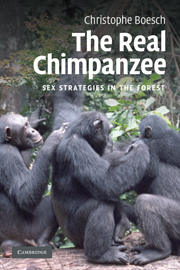Book contents
5 - Make war to get love
Published online by Cambridge University Press: 05 July 2015
Summary
Warfare is a typical human characteristic that sets us aside from all living species because of its mixture of horrific extreme violence combined with heroic cooperation among warriors. Humans are a strange species, a species that through civilization has lost the gentle and peaceful nature of the noble savage, considered by some to characterize our ancestors a nature we shared with our cousins, the great apes. Presumably like you, I believed this kind of statement to which most experts seemingly agree as it can be read in every textbook.
That is until the day in 1987, when I followed a large party, including Brutus and five males, in the hope that they would hunt. They rested under a group of red colobus monkeys in the far east of the territory. At half past two, they all jumped to their feet when they heard strangers drumming far off to the east, and responded with a few short screams and reassurance behaviour among themselves. They moved towards the drumming. They were quickly joined by a seventh male and eight females, most of them carrying babies. They formed a tight group and advanced silently and rapidly for 5 minutes in a straight line in the direction of the earlier drumming. Then, Brutus led them slightly away from the main group of strangers. All the females, with Kendo and Ulysse, now lagged behind, which is the typical behaviour of the females in such situations. They follow for a while as support but avoid the last, often physical, part of the attack.
Brutus with old Falstaff, Macho, powerful Schubert, Rousseau, one juvenile male and an adolescent immigrant female now progressed slowly in a line carefully listening for any signs of the strangers. They also looked regularly to the south-east from where a few calls of the strangers could be heard, presumably from the original main group, apparently unaware of their neighbours' approach.
- Type
- Chapter
- Information
- The Real ChimpanzeeSex Strategies in the Forest, pp. 76 - 108Publisher: Cambridge University PressPrint publication year: 2009



